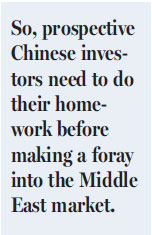Middle East a market to be tapped on the Road
Last year, China invested $29.5 billion in the Middle East, which accounted for 31.9 percent of the region's total foreign investment, according to a report issued by the Kuwait-based Arab Investment and Export Finance Company. That makes China the biggest investor in the Middle East, followed by the United States and the United Arab Emirates, the report said.
Which makes sense given that most Western investors would refrain from venturing into non-Arab markets in the region such as Iran and the Beijing-proposed Belt and Road Initiative is driving Chinese investment to the oil-rich Middle East, once a pivot on the ancient Silk Road.

China has earned itself a reputation for "getting things done" in major infrastructure projects at competitive costs and speed, as well as making the most of State-directed investment. It signed 14 cooperative agreements when Saudi Arabian King Salman bin Abdulaziz Al Saud visited China in March, including projects worth about $65 billion, from production capacity to investment cooperation. Last month, an electric train project in Iran backed by Chinese enterprises, which will connect Teheran and the northeastern city of Mashhad, also received government funding.









